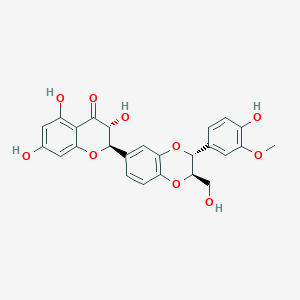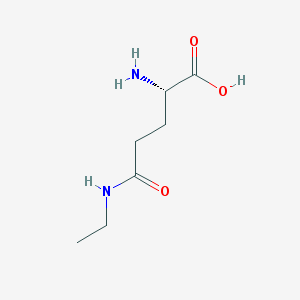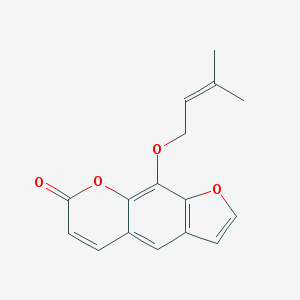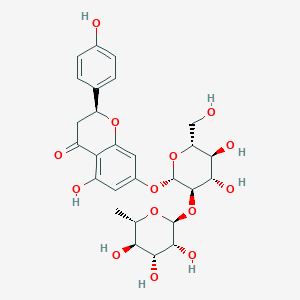Description
Silybin, also known as Silibinin, is the primary active constituent of silymarin, which is a standardized extract of the milk thistle seeds (Silybum marianum). Silybin is a flavonolignan, a type of flavonoid that exhibits a variety of pharmacological effects. It is the most active component of the silymarin complex and is largely responsible for the benefits attributed to milk thistle.
Function
Silybin functions primarily as an antioxidant and hepatoprotective agent. It works in several ways:
- Antioxidant Activity: It scavenges free radicals and increases the intracellular concentration of glutathione, a potent antioxidant found in the liver.
- Anti-inflammatory: Silybin has been shown to inhibit various inflammatory pathways, thereby reducing inflammation.
- Hepatoprotective: It prevents toxins from entering liver cells and stimulates regeneration of injured liver tissue.
- Anti-fibrotic: Silybin may help inhibit the synthesis of proteins responsible for liver fibrosis.
- Regulation of Lipids: It can modulate the lipid profile by improving the liver function and potentially reducing the absorption of cholesterol.
Applications
Silybin is mainly used for:
- Liver Disorders: It is most commonly used for conditions related to liver damage such as cirrhosis, jaundice, hepatitis, and liver poisoning from chemicals or mushroom toxins.
- Gallbladder Disorders: It is sometimes used for reducing gallbladder inflammation.
- Supplements: Silybin is often included in supplements aimed at supporting liver health.
- Clinical Research: It is also the subject of research concerning its potential applications in treating various other conditions, including certain types of cancer, neurodegenerative diseases, and metabolic syndrome.
Benefits
The potential benefits of silybin are primarily linked to its effects on the liver and include:
- Protecting the Liver: By stabilizing cell membranes and regenerating liver tissue, silybin can protect the liver from toxic injury.
- Supporting Detoxification: It aids in detoxification processes in the liver, helping to metabolize and excrete toxins.
- Enhancing Antioxidant Defense: Silybin may contribute to the overall antioxidant defense system of the body.
- Anti-Cancer Potential: Some studies suggest that silybin may exhibit anti-cancer properties by inhibiting the growth of certain cancer cells.
- Improving Liver Enzymes: In people with liver disease, silybin can help normalize elevated liver enzyme levels.





